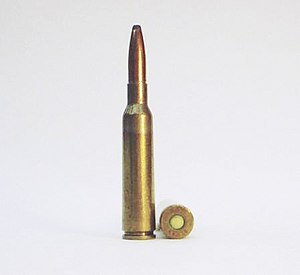6.5×55mm Swedish
| 6.5×55mm Swedish | ||||||||||||||||||||||||
|---|---|---|---|---|---|---|---|---|---|---|---|---|---|---|---|---|---|---|---|---|---|---|---|---|
 6.5×55mm Swedish
| ||||||||||||||||||||||||
| Type | Military Rifle | |||||||||||||||||||||||
| Place of origin |
|
|||||||||||||||||||||||
| Service history | ||||||||||||||||||||||||
| In service | 1894–1995 | |||||||||||||||||||||||
| Used by |
United Kingdoms of Sweden and Norway Sweden Norway |
|||||||||||||||||||||||
| Production history | ||||||||||||||||||||||||
| Designed | 1891 | |||||||||||||||||||||||
| Produced | 1894–present | |||||||||||||||||||||||
| Specifications | ||||||||||||||||||||||||
| Bullet diameter | 6.71 mm (0.264 in) | |||||||||||||||||||||||
| Neck diameter | 7.60 mm (0.299 in) | |||||||||||||||||||||||
| Shoulder diameter | 11.04 mm (0.435 in) | |||||||||||||||||||||||
| Base diameter | 12.20 mm (0.480 in) | |||||||||||||||||||||||
| Rim diameter | 12.20 mm (0.480 in) | |||||||||||||||||||||||
| Rim thickness | 1.50 mm (0.059 in) | |||||||||||||||||||||||
| Case length | 55.00 mm (2.165 in) | |||||||||||||||||||||||
| Overall length | 80.00 mm (3.150 in) | |||||||||||||||||||||||
| Case capacity | 3.75 cm3 (57.9 gr H2O) | |||||||||||||||||||||||
| Rifling twist | 220 mm (1-8.66 in) | |||||||||||||||||||||||
| Primer type | large rifle | |||||||||||||||||||||||
| Maximum pressure (C.I.P.) | 380.0 MPa (55,110 psi) | |||||||||||||||||||||||
| Maximum pressure (SAAMI) | 351.6 MPa (51,000 psi) | |||||||||||||||||||||||
| Ballistic performance | ||||||||||||||||||||||||
| ||||||||||||||||||||||||
| Source(s): Hodgdon RWS/RUAG Ammotec | ||||||||||||||||||||||||
The 6.5×55mm Swedish (designated as the 6.5×55 Swedish by the SAAMI and 6,5 × 55 SE by the C.I.P.) is a first-generation smokeless powder rimless bottlenecked rifle cartridge. Other common names for this cartridge include 6.5×55mm and 6.5×55mm Swedish Mauser and less commonly 6.5×55mm Mauser and 6.5×55mm Krag. It was developed in 1891 for use in the new service rifles then under consideration by the United Kingdoms of Sweden and Norway. The two nations had independent armies and consequently the normal procedure at the time was for their respective governments to use the same ammunition and then purchase small arms of their choice. Norway adopted the Krag–Jørgensen rifle, while Sweden adopted a Mauser rifle design.
The 6.5×55mm Swedish cartridge has a smaller bullet diameter and lower free recoil than other full-power service rifle cartridges like the .30-06 Springfield and 7.92×57mm Mauser, but thanks in part to its relatively roomy case with an uncommon 12.2 mm (0.480 in) diameter bolt face which was designed for loading long, heavy 6.5 mm bullets, has proven more successful than other first-generation smokeless-powder military cartridges of similar caliber such as the 6×60mm US Navy, 6.5×54mm Mannlicher–Schönauer, 6.5×53mmR Dutch Mannlicher, 6.5×52mm Carcano and 6.5×50mm Arisaka.
The Swedish-Norwegian Rifle Commission started its work in 1891. After extensive ballistic tests where different calibers were tested (8 mm, 7.5 mm, 7 mm, 6.5 mm etc.), the optimal caliber was determined to be 6.5 mm (0.256 in). Following this decision, a joint Norwegian-Swedish commission was established in December 1893. This commission worked through a series of meetings to decide on the different measurements for the cartridge case. A rimless cartridge case of 55 mm length was approved, and each possible measurement (diameter at base, diameter at neck, angle of case, angle of shoulder etc.) was decided upon. The corresponding dimensions of the cartridge chamber to be used in a future service rifle was also determined.
...
Wikipedia
